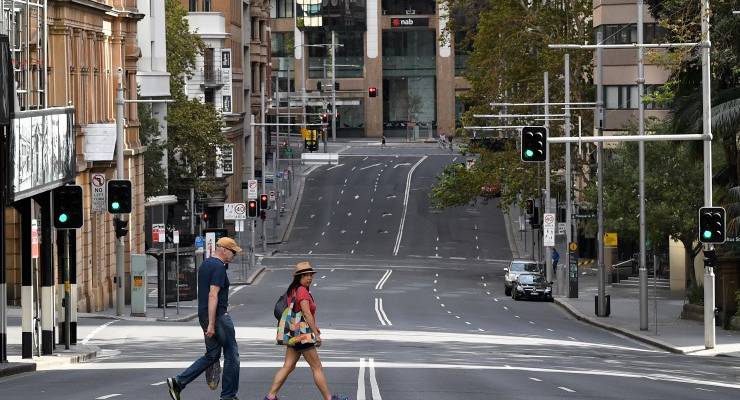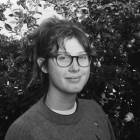
Journalism student and NGO worker Jordyn Beazley is keeping a COVID diary, detailing her life as a young Australian in lockdown.
Sunday
I should have finished my university assignment today. But instead I stared at the screen for a few hours and then gave up. After the initial scramble to remote learning settled, the first month of lockdown without social distractions and places to be was good for productivity.
Now, life is too shapeless and bland. Gone are the rules I had subconsciously drawn around places to help segment what needed to be done — the office is for work, university is for study and home is for rest.
It has now all moulded into the same corner of my house where my desk lives. Also gone are the rewards I used to dangle in front of myself, like the promise that if I buckle down and finish an assignment, then I won’t miss out on that party my friends are raving about.
This unenergised feeling compounds the guilt of not trying hard enough. Studying a journalism degree already feels like you’re clawing your way to the top to grab hold of one of the handful of cadet roles that publications can still afford.
The virus has only made this harder as the pandemic whacks the media industry with another flurry of assaults. I wonder, what will be left when I finish my degree at the end of the year?
Monday
I received a text message from the government: “Help us keep you safe and ease restrictions by downloading the CovidSafe app now”. I texted my sister to ask if she had downloaded it, she replied in seconds “yes, so I can get out of this apartment!”.
At six months pregnant she is scared to do much more than lap around her block, so is starting to rattle at the windows of her small Sydney apartment.
I told her I am still on the fence. At first it was because it felt like an Orwellian line had been crossed. But now it’s because the belief that a surveillance app, with all its flaws, will keep people safe from infection feels dangerous.
I reminded her to keep the app running and her iPhone unlocked.
Tuesday
I stumbled across a new walking track that hugs the edge of Melbourne’s Yarra River. I didn’t see a soul along the 2km trail shaded beneath a scraggly canopy of river red gums.
Finding it felt like a triumph, another to add to the list of trails that were close by my house all along, but I only took the time to discover during this period of self-isolation. I hope these small bouts of freedom everyone is experiencing in nature will create a new level appreciation for green spaces once this crisis is over.
Wednesday
On a drive to the supermarket there was traffic. Numerous cyclists flew past. The supermarket was packed, there were no lines of carefully spaced people out the front. It felt like any other Wednesday trip to the supermarket pre-pandemic.
This made my partner nervous. On the way home he said he isn’t ready for restrictions to be lifted. Having lost his job, the reality of being unemployed during a recession is starting to sink in.
He wants more time in his scramble to finish short courses and retrain so that he can be “ready” for when the safety net of doubled welfare payments is lifted and he must compete with the rest of the unemployed for limited jobs.
Thursday
I got an apologetic email from a colleague at the development NGO where I work, to say she was ashamed of a “snappy” email sent the night before. I had not read it that way, so it took me aback.
She explained it stemmed from struggling with the anxiety of preparing for the pandemic. She lives in a country that is labelled by the Global Health Security Index as one of 24 countries least equipped to cope.
There are few ventilators and no ICUs, little access to clean or even running water, no laptops and internet at the ready for remote learning, and no welfare payments to protect livelihoods.
It has dawned on me this week that the fanciful belief that this will soon be over is far from true. In some countries, it could be just the beginning.









Jordyn,
Regard this as practice for when the full effects of climate change start to bite.
Well be sure Download the app
You are wise to ponder whether you are training for an industry that certainly will not exist in anything resembling its current parlous form.
That this is yet another sponsored article ought to be a hint.
Well I for one loved your article. Journalism student .. a good fit. Good luck, Paul.
Jordyn’s got all the skills to get ahead in the industry: solipsism, contempt for the language, and attendant mastery of cliche. Potential employers will be reassured to discern not a skerrick of original thought in these emotings.
Seriously, is Crikey so desperate for support of its fringe views about the virus app that it’d turn even to the work experience kid for validation? Crossing an Orwellian line indeed. At least I think so…was there an app in The Road to Wigan Pier? Homage to Catalonia?
Orwell certainly had something to say about spreading the joy of disease to the better off in “Down & Out in Paris & London” when describing how the lower orders “prepared” the expensive meals in the Ritz & Hotel X.
There are parallels to a surveillance App in both 1984 and Animal Farm. However, I take my hat off to you for being able to name some of his lesser known work.
It’s generally misunderstood that in Nineteen Eighty Four that the great bulk of society, the unwashed lower orders (whom Eric Blair feared and loathed), were NOT under total surveillance – it was enough that they were well fed and worked hard for Victory.
It was only those of Winston Smith’s class, sufficiently educated to be useful and therefore potentially dangerous individuality who were subject to NewSpeak & thoughtcrime.
Rather as subscribers here are expected to pony up subscriptions but are subject to banal moderation and are not trusted to even comment on some articles – twice this week.
Sorry Sonny Prestatyn but what is your problem?? Why not accept Jordyn Beazley’s piece for what it is that is, one’s interpretation of the present situation one finds oneself in.? It just so happens that a substantial branch of research (qualitative – perhaps you may have heard about it) actually is based on one’s perception/experience of the world.
As a long term educator I find your apparent negativity both uninformed, unnecessary and boorish. Young people trying to make their way in to-day’s uncertainly need positive and constructive feedback and encouragement not your boring brand of negativity.
But then again given your attempt to ‘display’ your wide ranging knowledge base you are possible one of those who seeks to big note themselves at someone else’s expense. They are usually a dime a dozen at most universities in their insulated ivory towers. I generally find that with students/young people trying to find a direction in their life that if you cannot make positive constructive comments its best to say nothing.
I guess in the end that is pretty much what your comment has to say – nothing of any worth.
Lionheart
“if you cannot make positive constructive comments its best to say nothing”
Normally yes, but your own comment is a rule-proving (i.e. rule-testing) exception. What you have to say needed to be said. There is a rule, of Arab origin I believe, that goes something like, “Before speaking, ask yourself whether what you have to say is (1) true, (2) necessary, (3) kind. Do not speak unless two of the criteria have been met.” Your post met the first two criteria. I don’t think SP’s comment met any of them.
For my part, I ended the article with greater insight into how much more difficult these current circumstances are for the young. So, effective journalism for me.
Could I have been anywhere near as insightful as JB under the same circumstances at her age? The answer is no. I was going to say “I doubt it”, but that would have understated the case.
Are there errors and cliches? Probably, but not so as to raise my hackles.
As for the app thing, the sub-editor chose to highlight it. The writer, in passing, records her evolving opinion.